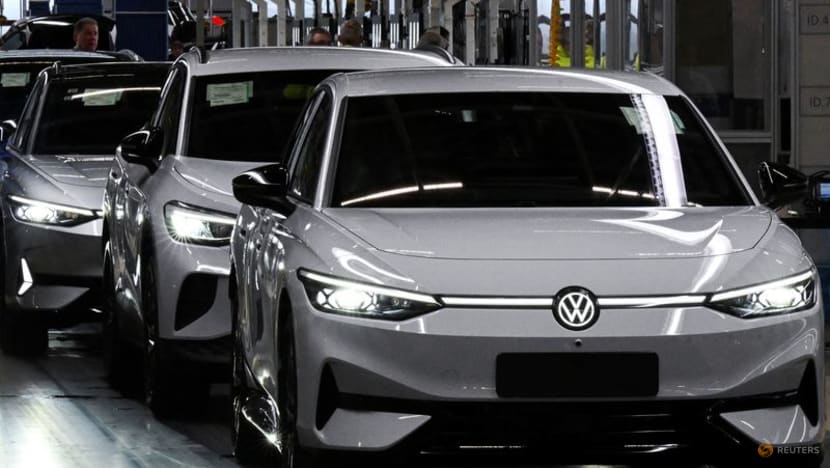Europe to announce action plan for auto sector amid sluggish EV growth, Chinese competition
The European Union is looking to phase out the sale of combustion engines by 2035, but the European market saw sluggish growth in electric vehicle sales last year.

FILE PHOTO: Volkswagen ID.7 electric cars are seen at the Volkswagen (VW) electric fleet lead plant in Emden, Germany, February 18, 2025. REUTERS/Carmen Jaspersen/File Photo

This audio is generated by an AI tool.
BRUSSELS: A roadmap to get the European Union’s auto industry back on track is set to be unveiled on Wednesday (Mar 5), amid sluggish growth in electric vehicle sales and increased competition from China.
The industry is facing a pivotal moment as the EU aims to phase out the sale of combustion engines by 2035.
However, carmakers fear that high manufacturing costs, strict regulations, and geopolitical headwinds are stalling their ability to keep up with the competition.
European Commission President Ursula von der Leyen said the bloc’s action plan will present a clear strategy to drive growth and boost innovation, while cutting back on red tape.
“We cannot let EVs become more expensive, but we also cannot afford to create new dependencies. So, we will explore direct support for EU battery producers,” she added.
“We will gradually introduce European content requirements for battery cells and components.”
SPLUTTERING SECTOR
Last year saw record EV sales globally, but the European market contracted by 3 per cent.
An Audi plant in the Belgian capital of Brussels also permanently shut its doors – something that the German carmaker largely attributes to a lack of demand for its high-end electric SUVs.
To tackle these issues, the European Commission on Monday proposed softening emission regulations following strategic meetings with industry leaders.
Initially, carmakers had until the end of 2025 to cut vehicle carbon dioxide emissions by 15 per cent compared to 2021 levels, or face fines.
While not calling for a complete U-turn, the Commission is proposing giving manufacturers three years to get up to speed. This would allow companies that are not meeting the targets to catch up in future years and avoid paying fines.
However, some observers said the EU’s changes rewards laggards and creates uncertainty over the bloc’s commitment to the green transition.
“What we’re seeing is that as the targets hit, the auto industry is finally bringing those affordable electric car models. They have all been timed for either the end of last year or the beginning of this year, and it’s beginning to work,” said Julia Poliscanova, senior director of vehicles and e-mobility supply chains at the European Federation for Transport and Environment.
“This (is) organic demand, as people see the model for them on the market rather than an overpriced huge premium SUV.”
In January, EV sales in Europe rose by about 35 per cent, amounting to a 15 per cent market share.
Supporters of the existing regulations said the data is proof that the threat of stricter rules is having the desired effect.
TRADE TENSIONS COMPLICATE GROWTH
Nevertheless, some in the industry said carrots – rather than sticks – are needed to boost the European auto market.
“We have very ambitious targets in Europe to decarbonise, but what we see is that the enabling conditions – charging infrastructure and demand stimulus measures – are not in place to get the market where the market needs to be,” said Sigrid de Vries, director-general of the European Automobile Manufacturers’ Association.
Broader trade tensions around the world have also continued to complicate the sector’s growth efforts.
EU member states remain divided over the bloc’s decision last year to impose additional tariffs of up to 35 per cent on Chinese-made EVs. Beijing has denied claims that it flooded the market with heavily subsidised vehicles.
Some European powers fear the extra duties could harm producers that rely on the Chinese market.
Meanwhile, the United States has also threatened to impose 25 per cent tariffs on EU goods, with US President Donald Trump singling out the auto sector as a point of contention.
European officials warned that tariffs represent a lose-lose for businesses and consumers alike, but said they will respond if needed to protect their industries.
“Our call on the European Commission is to try and really have open lines to negotiate – to go for a grand bargain rather than a tit-for-tat, and try and deescalate before there’s even a question of escalation,” said De Vries.
















